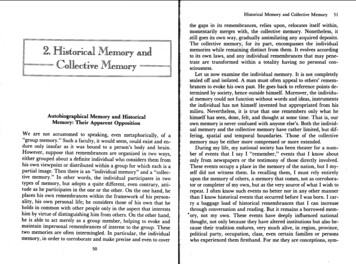
Transcription
Historical Memory and Collective Memory20IHist()Jrical MeJm()JrYandCollective MemoryIAutobiographical Memory and HistoricalMemory: Their Apparent OppositionWe are not accustomed to speaking, even metaphorically, of a"group memory." Such a faculty, it would seem, could exist and endure only insofar as it was bound to a person's body and brain.However, suppose that remembrances are organized in two ways,either grouped about a definite individual who considers them fromhis own viewpoint or distributed within a group for which each is apartial image. Then there is an "individual memory" and a "collective memory." In other words, the individual participates in twotypes of memory, but adopts a quite different, even contrary, attitude as he participates in the one or the other. On the one hand, heplaces his own remembrances within the framework of his personality, his own personal life; he considers those of his own that heholds in common with other people only in the aspect that interestshim by virtue of distinguishing him from others. On the other hand,he is able to act merely as a group member, helping to evoke andmaintain impersonal remembrances of interest to the group. Thesetwo memories are often intermingled. In particular, the individualmemory, in order to corroborate and make precise and even to cover5051the gaps in its remembrances, relies upon, relocates itself within,momentarily merges with, the collective memory. Nonetheless, itstillgoes its own way, gradually assimilating any acquired deposits.The collective memory, for its part, encompasses the individualmemories while remaining distinct. from them. It evolves accordingto its own laws, and any individual remembrances that may penetrate are transformed within a totality having no personal conSCIOusness.Let us now examine the individual memory. It is not completelysealed off and isolated. A man must often appeal to others' remembrances to .evoke his own past. He goes back to reference points determined by society, hence outside himself. Moreover, the individual memory could not function without words and ideas, instrumentsthe individual has not himself invented but appropriated from hismilieu. Nevertheless, it is true that one remembers only what hehimself has seen, done, felt, and thought at some time. That is, ourown memory is never confused with anyone else's. Both the individual memory and the collective memory have rather limited, but differing, spatial and temporal boundaries. Those of the collectivememory may be either more compressed or more extended.During my life, my national society has been theater for a number of events that I say I "remember," events that I know aboutonly from newspapers or the testimony of those directly involved.These events occupy a place in the memory of the nation, but I myself did not witness them. In recalling them, I must rely entirelyupon the memory of others, a memory that comes, not as corroborator or completer of my own, but as the very source of what I wish torepeat. I often know such events no better nor in any other manner. than I know historical events that occurred before I was born. I carry a baggage load of historical remembrances that I can increasethrough conversation and reading. But it remains a borrowed mem .ory, not my own. These events have deeply influenced nationalthought, not only because they have altered institutions but also because their tradition endures, very much alive, in region, province,political party, occupation, class, even certain families or personswho experienced them firsthand. For me they are conceptions, sym-
52The CollectiveMemorybols. I picture them pretty much as others do. I can imagine them,but I cannot remember them. I belong to a group with a part of mypersonality, so that everything that has occurred within it as long asI belonged-even everything that interested and transformed it before I entered-is in some sense familiar to me. But should I wishto restore the remembrance of a certain event in its entirety, I wouldhave to bring together all the partial and distorted reproductionsconcerning it that are held by all group members. By contrast, mypersonal remembrances are wholly mine, wholly in me.Therefore, there is reason to distinguish two sorts of memory.They might be labeled, if one prefers, internal or inward memoryand external memory, or personal memory and social memory. Iwould consider more accurate "autobiographical memory" and"historical memory." The former would make use of the latter,since our life history belongs, after all, to general history. Naturally, historical memory would cover a much broader expanse of time.However, it would represent the past only in a condensed and schematic way, while the memory of our own life would present aricher portrait with greater continuity.If our personal memory is understood to be something that weknow only from within, while the collective memory would be'known only from without, then the two will surely contrast sharply.I remember Reims because I lived there a whole year. But I also remember that Joan of Arc consecrated Charles VII there, because Ihave heard it said or read it. The story of Joan of Arc has been presented so often on the stage, on the movie screen, or elsewhere that Itruly have no difficulty imagining Joan of Arc at Reims. Meanwhile, I certainly know that I was not a witness to the event itself,that I cannot go beyond these words heard or read by me, that thesesymbols passed down through time are all that comes to me fromthat past. The same is true for every historical fact I know. Propernames, dates, formulas summarizing a long sequence of details, occasional anecdotes or quotations, are the epitaphs to those bygoneevents, as brief, general, and scant of meaning as most tombstone. inscriptions. History indeed resembles a crowded cemetery, whereroom must constantly be made for new tombstones.Historical Memory and Collective Memory53Were the past social milieu to live for us only in these historicalnotations, and, more generally speaking, were the collective memory composed only of dates, arbitrary definitions, and reminders ofevents, then it would most assuredly remain external to us. Manycitizens of our vast national societies never participate in the common interests of the majority, who read the newspaper and paysome attention to public affairs. Even we who do not so isolate ourselves may periodically become so absorbed that we no longer follow "current events." Later on, we may find ourselves reassemblingaround such a period in our life the public events of that time. Forexample, what happened in France and the world in 1877, the yearI was born? It was the year of the "16th of May," when the volatilepolitical situation truly gave birth to the Third Republic. De Brogliewas in power, and Gambetta declared that "he must resign or beforcibly removed." The painter Courbet died. Victor Hugo published the second volume of Legende des Siecles. The BoulevardSaint-Germain was completed in Paris, and construction began onthe Avenue de la Republique. The attention of all Europe focusedon Russia's war against Turkey. Osman Pasha was forced to surrender Plevna after a long and heroic defense. I thus reconstitute arather spacious framework, in which I feel myself quite lost. I amdoubtless caught up in the current of national life, but I hardly feelinvolved. I am like a passenger on a boat. As the riverbanks pass by,everything he sees is neatly fitted into the total landscape. But sup.pose he loses himself in tliought or is distracted by his travelingcompanions; he concerns himself only occasionally with what passesalong the banks. Later on, he will be able to remember where hehas traveled but few details of the landscape, and he will be able totrace his route on a map. Such a traveler may recover some forgotten memories or make others more precise, but he has not reallyhad contact with the country through which he passed.Certain psychologists apparently prefer to imagine historicalevents as auxiliary to our memory, functioning much as do the temporal partitions of a watch or calendar. Our life flows by in a continuous movement. But when we look back at what has unrolled,we always find it possible to assign its various portions to the de-
54The CollectiveMemoryHistoricalMemoryand CollectiveMemory 55marcations of collective time. Such temporal divisions are imposedfrom outside upon every individual memory precisely because theirsource is not in any single one of them. A social time defined in thisway would truly be external to the lived duration of each consciousness. We see this dearly in the case of a watch measuring astronomical time. But the same is also true of those dates on the clockface of history: they correspond to the most noteworthy events ofnational life, the occurrence of which we may be unaware of, theimportance of which we recognize only later. Our lives thus sit onthe surface of social bodies, merely observing their alterations and'putting up with their disturbances. An event takes its place in thesequence of historical facts only some time after its occurrence.Thus we can link the various phases of our life to national eventsonly after the fact. Nothing demonstrates better how artificial andexternal is that operation that consists of referring to demarcationsof collective life for mental landmarks. Nothing demonstrates moreclearly that we really study distinct objects when we focus on eitherindividual memory or collective memory. The events and dates constituting the very substance of group life can be for the individualonly so many external signs, which he can use as reference pointsonly by going outside himself.Of course, the collective memory would play a very secondaryrole in the fixation of our remembrances if it had no other contentthan such sequences of dates or lists of facts. But such a conceptionis remarkably narrow and does not correspond to reality. For thatvery reason I have had difficulty presenting it in this way. However, such an approach was necessary, for this conception accordswith a widely accepted doctrine. The memory is usually consideredas a properly individual faculty-that is, as appearing in a consciousness reduced solely to its own resources, isolated from anyoneelse and capable of evoking by will or chance states previously experienced. Nevertheless, since it is impossible to deny that we oftenreplace our remembrances within a space and time whose demarcations we share with others, or that we also situate them within datesthat have meaning only in relation to a group to which we belong,these facts are acknowledged to be the case. But it is a sort of mini-mal concession that does not impair, in the minds of those grantingit, the specificity of the individual memory.The Real Interpenetration ofHistoric;:aland AutobiographicalMemory (Contemporary History)AsStendhal observed:Now as I write my life in 1835, I make many discoveries. Theyare like great fragments of frescoon a wall, which, long forgotten,reappear suddenly, and by the side of these well-preservedfragments there are . great gaps where there's nothing to be seen butthe bricks of the wall. The plaster on which the fresco had beenpainted has fallen and the fresco has gone forever. There are nodates besidesthe piecesof fresco that remain, and now in 1835, Ihaveto hunt for the dates. Fortunately there's no harm in an anachronism, a confusionof a year or two. After my arrival in Paris in1799,my life becameinvolvedwith public eventsand all dates arecertain. In 1835, I discoverthe shape and the "why" of pastevents.lSuch dates and the historical and national events they represent(for this is surely the sense in which Stendahl understands them)can be totally external, at least in appearance, to the circumstances. of our life. But later on, as we reflect upon them, we "make manydiscoveries"; we "discover the shape and the 'why' of events." Thismight be understood in various ways. When I page through a contemporary history and review the sequence of events in France orEurope since my birth, during the first eight or ten year of my life,I indeed get the impression of an external framework of which I.was then unaware and I learn to relocate my childhood within thehistory of my times. Even though I clarify from outside this first period of my life, however, my memory scarcely grows richer in itspersonal aspect. I gain no revelations of my childhood; nothing new151.1 Stendhal, Vie d'Henri Brulard, ed. Henri Martineau(Paris: Le DivanI, 1949),p.
56The CollectiveMemoryemerges. I did not yet read newspapers or participate in adult conversation. At present I can formulate an idea, necessarily arbitrary,of the national affairs that were of lasting interest to my parents,but I have no direct remembrances of these events or my parents'reactions to them. It seems clear to me that the first national eventthat penetrated the fabric of my childhood impressions was the funeral of Victor Hugo. (I was then eight years old.) I see myself atmy father's side, walking towards the Arc de Triomphe de l'Etoilewhere the catafalque had been erected; I see myself the next daywatching the funeral parade from a balcony at the corner of theRue Souffiot and the Rue Gay-Lussac.Had nothing, then, of my encompassing national group filtereddown to me and my narrow circle of concerns until this time? Yet Iwas. always with my parents. They were exposed to many influences. They were, in part, the people they were because they livedthrough that period, in a certain country under certain national andpolitical circumstances. Perhaps I can find no trace of definite "historical" events in their overt habits, in the general tone of their feelings. But there certainly existed in France during the ten-, fifteen-,or twenty-year period following taeFranco-Prussian War of 18701871 a remarkable psychological and social atmosphere unique tothis time. My parents belonged to this period; they acquired certainhabits and characteristics that became part of their personality andmade an early impression upon me. What is at issue here is nolonger mere dates or facts. Of course, even contemporary history toooften boils down to a series of overly abstract conceptions. But I canfill in these conceptions, substituting images and impressions forthese ideas, when I look over the paintings, portraits, and engravings of the time or think about the books that appeared, the playspresented, the style of the period, the jokes and humor in vogue.I don't fancy that this picture of a world so recently vanished andnow re-created by artificial means will become the slightly contrived background on which to project profiles of my parents-asort of solution in which I immerse my own past in order to "develop" it, as one might a film. On the contrary, the world of my childhood, as I recover it from memory, fits so naturally into the frame-Historical Memory and Collective Memory57work of recent history reconstituted by formal study because italready bears the stamp of that history. What I discover is that byattentive effort I can recover, in my remembrances of my littleworld, a semblance of the surrounding social milieu. Many scattered details, perhaps too familiar for me to have ever consideredconnecting them and inquiring into their meaning, now stand outand come together. I learn to distinguish, in the character 'of myparents and the period, what can be accounted for not by humannature or circumstances common to other periods but only by thepeculiarities of the national milieu at that time. My parents-indeed their friends and every adult I met then-were (like all of us)a product of their times. When I want to picture that period's lifeand thought, I direct my reflections toward them. This is whatmakes contemporary history interest me in a way the history of preceding periods cannot. Of course, I cannot claim to remember theparticulars of these events, since I am familiar with them onlythrough reading. But, in contrast to other periods, the time contemporary with my childhood lives in my memory because I was immersed within it and one facet of my remembrances is but a reflection of it.Even when considering childhood remembrances, then, we arebetter off not to distinguish a personal memory that would reproduce past impressions just as they originally were and would nevertake us beyond the restricted circle of our family, school, andfriends, from a "historical" memory that would be composed onlyof national events unfamiliar to us as children. We had best avoidthis distinction between one memory that puts us in touch with onlyourself (or with a self, really, broadened to include the group encompassing the world of the child) and another memory that enables us to penetrate into a milieu of which we were unaware at thetime but within which our life actually unfolded. Our memory trulyrests not on learned history but on lived history. By the term "history" e must understand, then, not a chronological sequence ofevents and dates, but whatever distinguishes one period from allothers, something of which books and narratives generally give usonly a very schematic and incomplete picture.
58Historical Memory and Collective MemoryThe CollectiveMemoryI will probably be accused of stripping from this form of collective memory we call "history" its impersonal character, this abstract precision and relative simplicity that makes so appropriate aframework to bolster our individual memory. If we limit ourselvesto the impressions made on us by such events in history, or by ourparents' attitudes toward events that later on gain historical significance, or even by the customs, the ways of speaking and acting peculiar to a period, what would distinguish these from anything elsethat concerned our childhood but was not retained in the nationalmemory? How could the child evaluate the successive portions ofthe picture life unfolds before him? Above all, why should he be attracted by the facts and characteristics of interest to adults, especially as he lacks the many spatial and temporal terms for comparisonthat adults possess?In effect, a war, rebellion, national ceremony, popular festivity,new kind of transportation, or great construction can be consideredfrom two distinct viewpoints. They are events, unique in their kind,that alter group life. But they also dissolve into a series of imagestraversing the individual consciousness. The child retaining onlythese images would find that some standout in his mind due totheir brilliance, intensity, and unique quality. The same would occur for many images of lesser events. Imagine a child arriving atnight at a railroad station crowded with soldiers. Whether theywere on their way to, or back from, the trenches, or merely on maneuvers, would make no difference at all to him. Wouldn't the distant artillery of Waterloo be but muted thunder? Any being resembling such a youngster, reduced solely to his perceptions, wouldkeep only a fragile and transitory remembrance of such a scene. Tograsp the historical reality underlying that image, he would have togo outside himself and be placed within a group viewpoint, so thathe might see how such an event marked a famous date because it isimbued with the concerns, interests, passions, of a nation. But atthat moment the event would cease to be merely a personal impression. We have regained contact with the scheme of history. Thusmy critic would conclude that the individual must rely on the his. torical memory. Through it, a fact external to my childhood stamps1I.59its mark on a certain hour or day and enables me to recall those moments later on. But the mark itself isa superficial stamping fromoutside, unconnected with my personal memory or childhood impressions.Underlying such an analysis, however, remains the idea thatminds are as neatly compartmentalized as the organisms physicallysupporting them. Each of us is first and foremost sealed withinhimself. How to account, then, for the fact that one person communicates and adapts his thoughts to those of others? My critic 'mightadmit that the individual creates some kind, of artificial milieu, external to everyone of these personal thoughts, though encompassingthem all-a collective space and time, a collective history. Thethoughts of all persons come together within such frameworks,which assume that each has momentarily ceased to be himself. Eachperson soon returns into himself, introducing into his memory theready-made reference points and demarcations brought from without. We connect our remembrances to these reference points, without any sharing of substance or closer relationship occurring between them. That is why these general and historical conceptionsplay only a secondary role: they actually presuppose the prior andautonomous existence of the personal memory. Collective remembrancesmight be laid on individual remembrances, providing ahandier and surer grip on them. First, however, individual remembrances must be present, lest memory function without content.Surely there must have been a day when I met a certain friend forthe first time or, as Blondel says, when I attended the lycee for thefirst time.2 These are historical conceptions. But if I haven't inwardly preserved a personal remembrance of that first meeting orfirst day of class, this conception would remain up in the air, thatframework would be empty, and I would recall nothing-so obvious does it seem that there is in every act of memory an elementspecific to it, that is the very existence of self-sufficient individualconSClOusness. Charles Blonde!, "Critical Review of Maurice Halbwachs' Les Cadres sociaux de Lamemoire," Revue phiLosoPhique 101 (1926), p. 296 .
60The CollectiveMemoryLived History in ChildhoodBut such a distinction-between a memory employing no frameworks, or at best only words and a few conceptions borrowed frompractical life, to order its remembrances, and a collective or historical framework without any memory, because it is never constructed,reconstructed, and preserved in the memory of the individual-isnot very plausible. As soon as a child leaves the stage of purely sensory life and becomes interested in the meaning of images andscenes that he perceives, it can be said that he thinks in commonwith others, that his thought is divided between the flood of whollypersonal impressions and the various currents of collective thought.He is no longer enclosed within himself, for his thinking now commands entirely new perspectives which he knows are not his alone.Nor has he gone outside himself and perforce compartmentalizedhis mind to accommodate these series of thoughts common in hisgroup, because these new outwardly oriented concerns have alwaysinterested the "inner man" in one way or another and are not entirely foreign to his personal life.From the balcony of his grandfather's home in Grenoble, Stendhal as a child witnessed the Day of the Tiles, a mass uprising atthe start of the French Revolution.Some forty-three years later, the image is as clear as ever in mymind. A journeyman hatter, stabbed in the back by a bayonet, so Iheard, was walking in great pain supported by two men over whoseshoulders his arms were laid. He wore no coat, his shirt and buff orwhite pants were soaked with blood. I can still see him. The woundfrom which the blood was pouring out was in the small of his back,about opposite the navel.They were helping him to walk with great difficulty to his roomon the sixth floor of the Perier house. He died on reaching it.I saw the poor wretch on each landing of the Periers' staircase,which was lighted by big windows overlooking the square.This memory, naturally, is the clearest I have from those days.3I Vie d'Henri Brulard, p. 121.Historical Memory and Collective Memory61This is an image all right, but an image centered within a sceneof a mass revolution that Stendhal himself witnessed. How oftenmust he have heard that story told later on, especially since this uprising apparently initiated a turbulent and decisive period in politics. In any case, even were he unaware of the place this day wouldhave in history (at least in Grenoble's history), he could surmisefrom the extraordinary activity in the street, and from the gesturesand comments of his relatives, that this event went beyond the circleof family and neighborhood. Another day during this period, he seeshimself in the library, listening to his grandfather, who is in a roomfull of people. "But why such a crowd? What was the occasion?The image does not tell me that. It's no more than an image."Nonetheless, would he have preserved such a remembrance (as hedid of the Day of Tiles) were it not fitted within a framework of enduring concerns that emerged within him at this time, concerns thatalready involved him in a more extensive current of collectivethought?.The remembrance may not be immediately caught up in such acurrent, and some time may elapse before the meaning of the eventis understood. What is essential is that the meaning should soon become clear, while the remembrance is still fresh. Then we see radiating from and about the remembrance its historical significance, asit were. The attitude of adults who are also present confirms thatan event that has attracted our notice merits retention. We remember it because others about us are interested in it. Later on we willbetter understand why. Caught at first within the main current,perhaps the remembrance had been sidetracked by the greeneryalong the riverbank. Currents of collective thought flow through thechild's mind, but only in the long run do they gather in everythingbelonging to them.One of my earliest remembrances is of a small hotel where Russians stayed. It was located opposite our house on Rue Gay-Lussac,next to a convent, on the present site of the oceanographic institute.I remember them in their fur caps, sitting by the door with theirwives and children. Despite their strange features and dress, Imight not have watched them so much had not passers-by stopped,
62The Collective Memoryand my own parents come out on the balcony to look at them. Bittenby rabid wolves, these inhabitants of Siberia settled in Paris nearthe Rue d'Ulm and the Ecole Normale to receive treatment fromPasteur. For the first time I heard that name and pictured to myselfthe existence of scientists who make discoveries. I have no idea howmuch I understood of such matters. Perhaps I fully understood itonly later. But I do not believe that this remembrance would haveremained so clear in my mind had not this image oriented mythought to new horizons, toward unknown regions from which Ifelt gradually less distant.Such disturbances of a social milieu, which cause the child tosuddenly get a glimpse of the political and national life beyond hisown narrow circle, are infrequent. When he finally joins seriousadult conversation or reads the newspapers, the child will feel himself discovering an unknown land. But this will not be the first timethat he has come in contact with a social milieu more extensive thanhis family or his small circle of playmates and parents' friends. Parents and children each have their own interests. The boundariesseparating these two zones of thought are, for many reasons, notsurmounted. But the child does come in contact with a class ofadults whose level of thought approximates his own-servants, forexample. The child readily converses with them, taking revengeagainst the silence and reserve to which his parents condemn him inmatters that he is "too young" to know about. Servants may talkfreely to and with the child, who understands because they oftencommunicate in a childlike manner. Almost all that I learned andcould understand of the Franco-Prussian War, Paris Commune,Second Empire, and Third Republic came from a good old woman,full of superstition and prejudice, who blindly accepted the pictureof events and regimes painted by popular imagination. She informed me of the vague rumors that like the backwash of history,spread among the peasants, workers, and common people. My parents could only shake their heads' in disbelief at hearing such tales.In those moments I gained an understanding, however confused, ofthe human milieus disturbed by these events, if not of the eventsthemselves. Even today my memory evokes that first historicalHistorical Memory and CollectiveMemory63framework of childhood along with my earliest impressions. In anycase, this was the way I first pictured events just before my birth. IfI now recognize how inaccurate these stories really were, I can onlyaffirm that I took a sympathetic interest in those troubled watersand that more than one of those confused images still managed toenframe, even as it deformed, some of my remembrances from thattime.The Living Bond of GenerationsThe child is provided access to an even more distant past by hisgrandparents. Perhaps grandparents and grandchildren becomeclose because both are, for different reasons, uninterested in thecontemporary events that engross the parents. As Marc Bloch says:In rural societies, the young are quite frequently left entrusted during the day to the care of the "old." The father is occupied in thefield and the mother is preoccupied with the many household tasks.The child receives as much, and even more, of the legacy of variouscustoms and traditions from them as from his parents.4The grandparents and the elderly are clearly products of theirown times. The child doesn't immediately perceive and distinguishthose characteristics in his grandfather due solely to age from thosestamped on him by that society, now extinct, in which he lived and'grew up. The child, on arriving in the city, neighborhood, andhome of his grandfather, vaguely senses that he is entering a different territory. It is not foreign to him, however; for it agrees verywell with the character of the oldest members of his family. He.
Therefore, there is reason to distinguish two sorts of memory. They might be labeled, if one prefers, internal or inward memory and external memory, or personal memory and social memory. I would consider more accurate "autobiographical memory" and "historical memory." The former would make use of the latter,
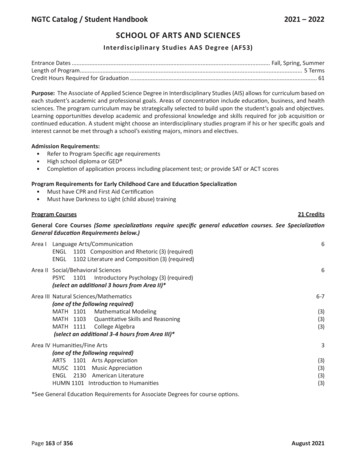


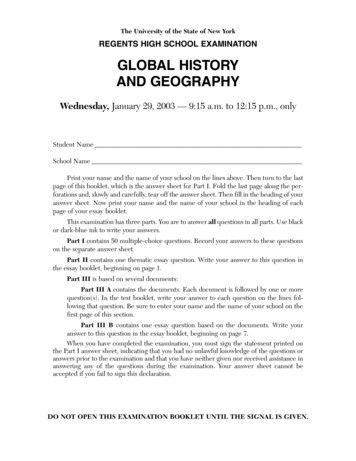


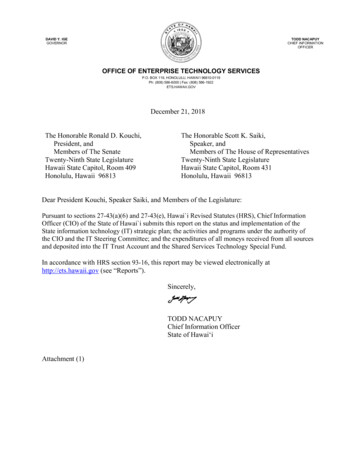
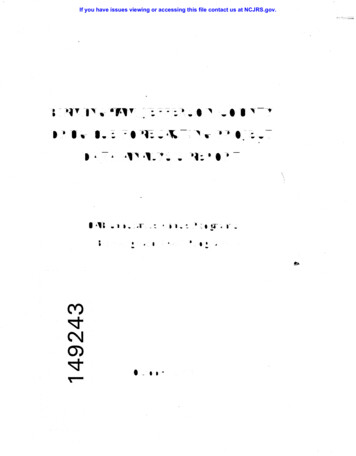
![%DFNJURXQG &KHFN XWKRUL]DWLRQ DQG 'LVFORVXUH . -](/img/2/employeeauthorization.jpg)

